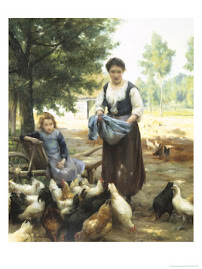Raised in a Christian culture, I wasn't aware until the past few years how loaded my speech is with "Christianese"--that Christian-culture lingo that only Believers understand. We have our own dialect, the language of the Christian Ghetto, and we think everyone speaks this way, or at least that everyone should understand.
It's sort of like the words computer geeks use that make me scratch my head. I remember when words like download, software, and gigabyte puzzled, confused, and frustrated me, even put me off. Then when I married a computer guy, started using computers, and "got inside the culture" (albeit the very very edge--I'm still almost computer illiterate), it began to make sense. In order to "evangelize" me and help me understand computers so I'd want to use them, Billy didn't speak computerese, he put it in language I could understand.
That's how we have to think when we interact with non-Christians. We have to realize that sometimes the language that's familiar to us means nothing to them, and in order to reach them we have to move beyond Christian cliche and use terms that are fresh. I'm not suggesting that we compromise our message, which seems to be the greatest fear of those who oppose new approaches to sharing the gospel. I'm just saying that we should at least attempt to speak to people on the outside of our culture in words they can grasp.
That said, I usually don't recognize Christianese when I speak it. Much as I try to replace the tired old verbage with language that will connect with those unfamiliar with Christianity, I find those same traditional terms coming out of my mouth. It's so familiar that I don't realize how it sounds to those outside.
One of the most helpful things I've done to make baby steps in the right direction is to read behind authors who don't speak Christianese. Dallas Willard, Lauren Winner, and the controversial Brian Maclaren are a few that come to mind. (For the record, a lot of what Maclaren says confuses me and this isn't an endorsement of him--but his work is of great benefit when it comes to breaking out of Christian ghetto language. Dalllas Willard and Lauren Winner are two of my favorite authors of all time.)
But I still feel that I don't get an accurate perception of what my Christianese sounds like to others, or even at times which terms are Christianese and which are not.
What about you? Is there a dictionary of Christianese out there somewhere? Does anyone know where I could go to find out what terms I'm using that would puzzle a non-Christian? And how do I go about reforming my language so that it stays true to the gospel but is still understandable to those who have no religious background? Thoughts anyone?
Subscribe to:
Post Comments (Atom)







2 comments:
As someone who not only has to deal with those who have no understanding of KJ English, what baptism is about, or even common decency, I can relate. Now add in a 6th grade reading level at best, and you can see why we have to do what Jesus did...simple stories, simple lanquage...like teaching a kids SS class.
For your dictionary, here are some that I didn't expect, but lots of people really have no idea about,and yes I am serious...
Evangelism, modesty, saved, salvation, fellowship, repentance, believer
I could go on, but you get the picture. I'm in an extreme area, but I'm sure we all have people groups around us in the same boat.
That's exactly what I'm talking about. See, I used Believer in the very first paragraph! I believe you when you say you are serious. I'm sure it's even more true where you are, but I think we'd be surprised at how those same words are misunderstood or not understood in most areas of the culture today--like everywhere that's not the Bible belt.
Post a Comment